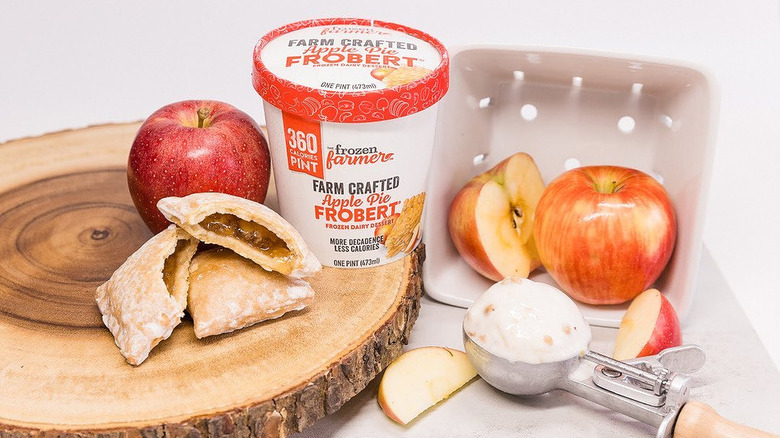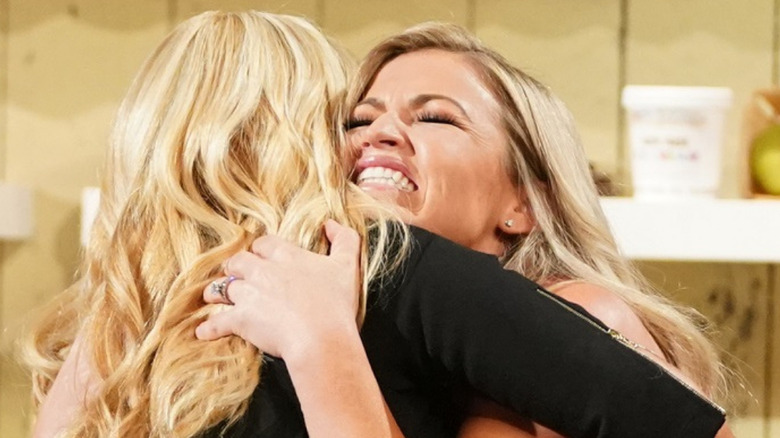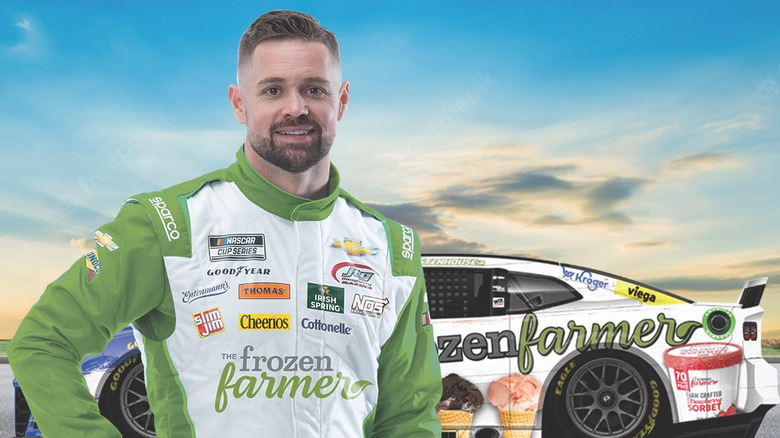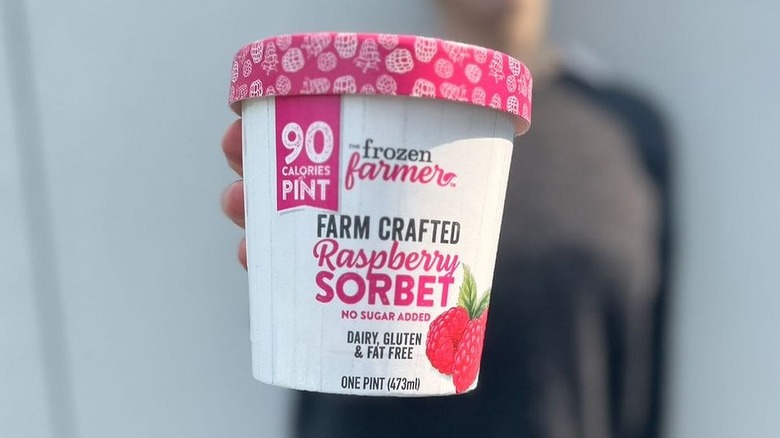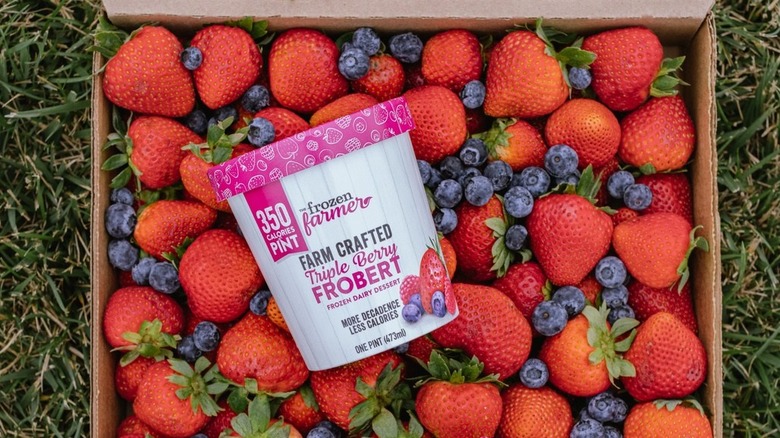Frozen Farmer: Here's What Happened After Shark Tank
When a former Ms. Delaware stepped onto the "Shark Tank" set wearing a pageant gown and sparkling crown, the infamous Shark investors did a double take. The intrigue only deepened when Katey Evans, founder of Frozen Farmer, explained how her handmade sorbet-style ice cream is made from "ugly fruit," the kind that's still delicious and fresh but scorned because it's not "perfect" in appearance.
Commonly known by descriptors such as blemished, damaged, or misfit fruit, the strawberries, blueberries, melons, cherries, apples, and myriad fruits making up the icy Frozen Farmer treats offer a solution to the growing problem of food waste. With at least 20% of America's produce remaining on farms because of appearance alone, the issue affects farmers, consumers, and everyone in between.
As part of a third-generation farming family running a 3,000-acre grain and produce operation, Evans knows the issues all too well, including the strict FDA grading system for fruits, like a produce beauty pageant that discards less luminous contestants. This led to the launching of her ice cream and sorbet products in 2015, then adding a "nice cream" treat that's a combination of the two.
Once-discarded fruits at Evans Farms in Delaware now had a proven new life, and Evans arrived at "Shark Tank" ready to take things up a notch. Her success over several years would assumably be a shoo-in for a Shark deal –– but not so fast. The Sharks nibbled and tasted, literally, before sinking their teeth into bottom-line issues.
What happened to Frozen Farmer on Shark Tank
Appearing on Season 11, episode 17 of "Shark Tank," which aired in March 2020, the Frozen Farmer entrepreneur came ready to face the full scrutiny of celebrity Shark investors Mark Cuban, Lori Greiner, Daymond John, Barbara Corcoran, and Kevin O'Leary. She presented an investment ask of $125,000 for a 20% share of her hand-earned, homemade ice cream enterprise.
While doling out tasty samples of the product, Evans explained that the concept was a food-waste warrior enabling sustainable food systems and helping farmers tap into the full potential of their produce harvests. It also encourages women-owned business endeavors, including her own mother, Mama Jo Ellen, whose home-spun recipes fuel the deliciousness at Frozen Farmer.
The Sharks were quick to circle, questioning everything from profit margins to packaging, commercial kitchen facilities, shipping issues, market competition, and expected freezer needs. Evans revealed $310,000 in revenue over the prior year, with a presence in 70 regional grocery outlets. She was looking for financial support in order to maintain current customers, expand nationwide, and find a reputable co-packer, which is a food-industry term for contracted companies that handle packaging and product labeling.
The Sharks pondered the issues and whether Frozen Farmer was compatible with their investment interests, eventually opting out, one by one, until only Greiner remained. With a stipulation for upgraded packaging, Greiner embraced the "imperfect perfection" concept and made the accepted offer of $125,000 for 30% ownership.
Frozen Farmer after Shark Tank
As fate would have it, the "Shark Tank" air date in March 2020 coincided with the week America shut down over the COVID-19 pandemic. Viewership was high, but sudden supply-chain issues for food outlets threatened Frozen Farmer's coveted supermarket deals. However, "Shark Tank," for whatever reason, re-aired the episode featuring Evans just one month later. This led to doors creaking open, which eventually became floodgates.
Greiner followed through with her commitment, noting on a "Shark Tank" update show in 2021 that Evans was among the hardest-working people she'd ever invested in. By that update, just one year after the show aired, the once-small-time female farmer from Delaware raked in more than $1 million in ice cream, sorbet, and "nice cream" sales, in addition to about $15 million in committed purchase orders.
They also noted a deal in the works for a co-packer, as well as new product packaging and a replacement name for the "nice cream" moniker. It is now the "Frobert" product, which got a boost from the massive Kroger grocery chain debuting an apple pie Frobert collaboration with Frozen Farmer.
"Shark Tank" investors were only the beginning of Frozen Farmer's celebrity brush-ups, including NASCAR star Ricky Stenhouse Jr. As all eyes followed the driver's No. 47 Camaro ZL1 in the 2022 NASCAR Cup Series, guess whose name emblazoned his clothing and car in supersized logos? You guessed it: Frozen Farmer, due to its sponsorship in coordination with Kroger.
Is Frozen Farmer still in business?
The Frozen Farmer is definitely still in business, and it's thriving by all accounts. Its products now appear in at least 8,000 stores nationwide, including the Kroger chain — as well as Giant Foods, Stop&Shop, and more. Soon after the "Shark Tank" appearance and the reality of explosive growth, local bank WSFS extended a $2.5 million line of credit to Frozen Farmer, noting the value of supporting hard-working local farmers and breaking the cycle of food waste. Shark investor Lori Greiner states that the company pulled $6.5 million in retail revenue within a year and a half of the "Shark Tank" episode airing.
The brand now showcases eight different sorbet flavors: peach, cherry, honeydew, mango, raspberry, strawberry, watermelon, and strawberry lemonade. Froberts have expanded beyond the Kroger-affiliated apple pie and now include double chocolate cherry, triple berry, blueberry strudel, and orange cream versions. However, an "out of stock" notice often appears for direct shipment-to-consumer orders via the website.
The family still operates the creamery from the farm in Delaware, with Evans stating in a Giant Foods YouTube video that it's the heart of who they are. She notes that as the earth's population increases, the number of farmers decreases, reiterating the need to continually raise productivity while simultaneously making good use of everything they already grow and produce.
What's next for Frozen Farmer?
Frozen Farmer appears to be moving steadily forward in the retail business of selling sorbet and its own unique Frobert line. Yet, life on the family farm continues, with the official company Facebook page announcing weather-permitting events such as a 2022 "Little Fall Fun" with bouncy houses, fall crafts, and old-fashioned pumpkin carving contests. In spite of "Shark Tank" fame, they continue to operate their popular Frozen Farmer food truck and ice cream shop, which sells scoops, pints, and elaborate ice cream cakes.
The in-store products stick to their "healthy food" roots, which the busy mom and business owner notes are low in fat and many still come with no sugar added, such as the honeydew sorbet made with farm-fresh melons. They also dish out farm-exclusive flavors in Delaware, far from the bright lights and big money of national Shark investors. A recurring favorite is the seasonal summertime sweet corn ice cream.
The continued collaboration with Kroger is slated to expand beyond grocery store freezer bins and into a joint sustainability mission. Through its Zero Hunger / Zero Waste Foundation, Kroger targets hunger, food waste, equitable food systems, and natural resource conservation in agriculture. In 2025, Frozen Farmer announced a collaboration celebrating Barbie's 65th anniversary. It launched a new product, Freezer Squeezers, in strawberry lemonade and Malibu Mango pineapple, as well as ice cream flavors Raspberry Cupcake Glitz, Beach House Brookies & Cream, Dream Orange & Cream, and Pink Party Cake Pop.

